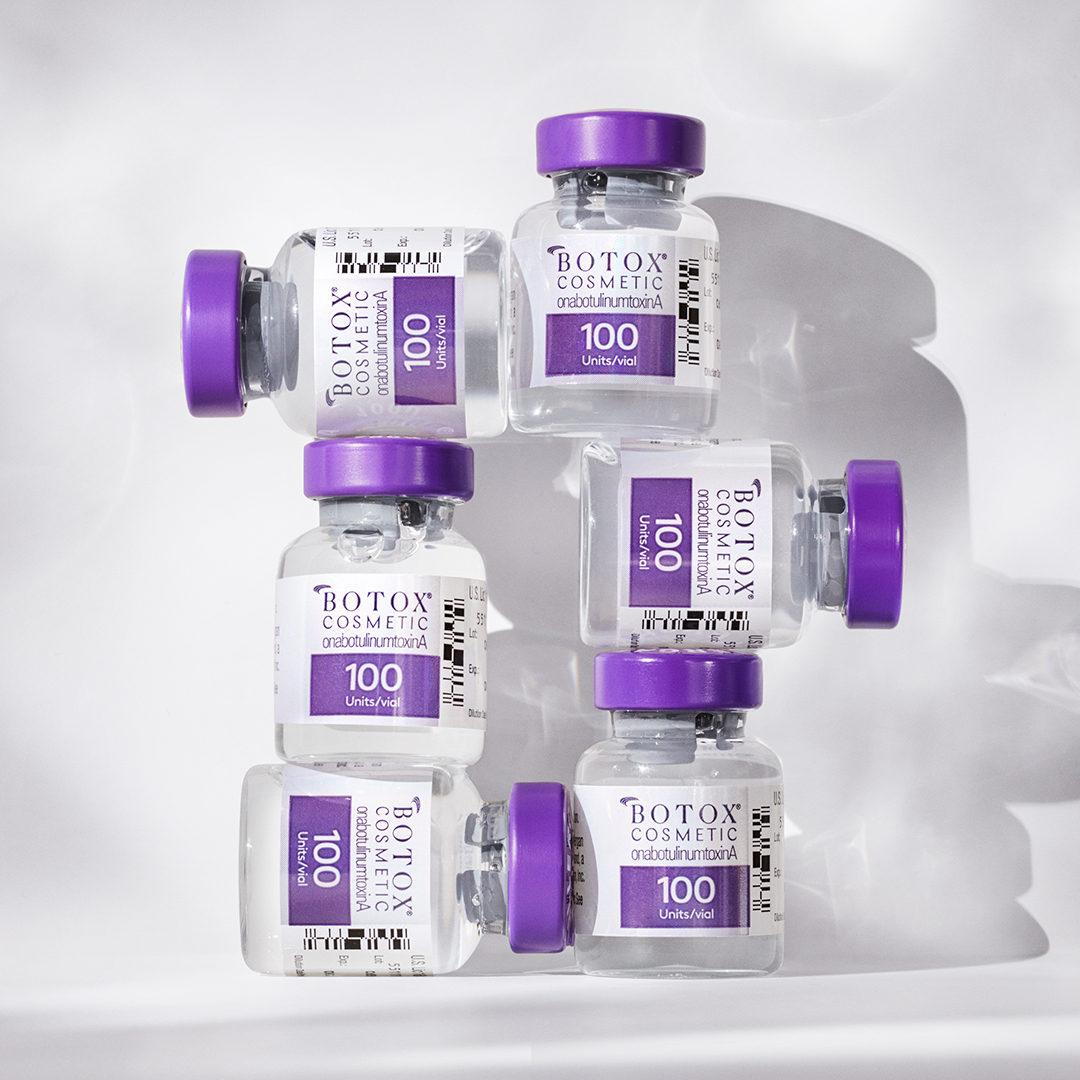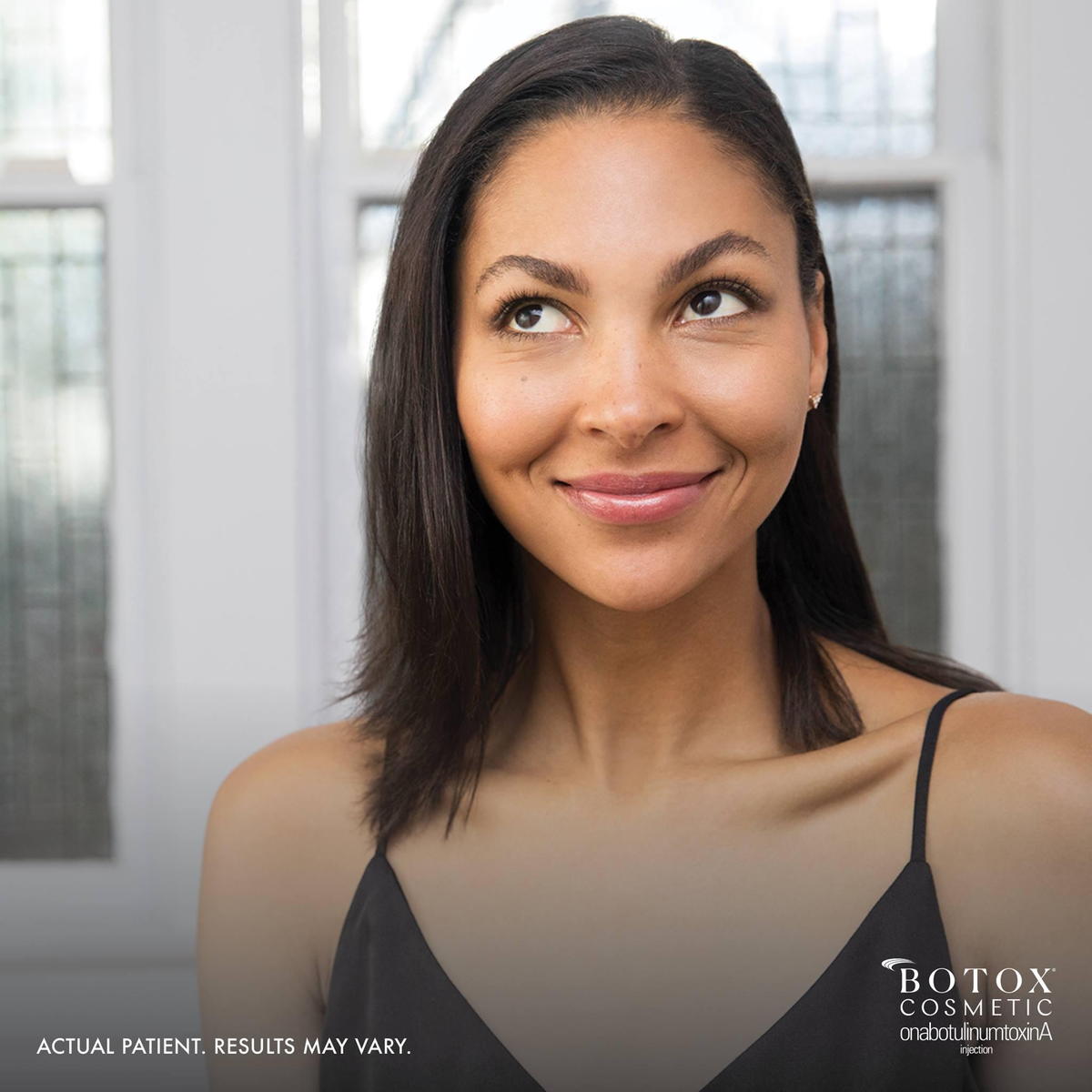What Is Botox®? Everything You Want to Know

- posted: Apr. 23, 2023
If you're considering getting a Botox® Cosmetic injection, you may have a lot of questions. What is Botox®? How does it work? When will I see results? This article will answer all of your questions and provide tips on how to prepare for your Botox® treatment.
What is Botox®?
Botox® is an FDA-approved neurotoxin that temporarily relaxes facial muscles to reduce the appearance of wrinkles and fine lines around the eyes, forehead, and mouth. It works by temporarily blocking nerve signals that cause muscle contractions, preventing them from forming wrinkles in the skin. Botox® can also be used to treat excessive sweating (hyperhidrosis) and muscle spasms.
fine lines around the eyes, forehead, and mouth. It works by temporarily blocking nerve signals that cause muscle contractions, preventing them from forming wrinkles in the skin. Botox® can also be used to treat excessive sweating (hyperhidrosis) and muscle spasms.
Botox® injections are most commonly used as an anti-aging treatment. By reducing wrinkles and fine lines, they can help patients look younger and feel more confident about their appearance. Additionally, since it only takes about 10 minutes to administer a Botox® injection, it’s quick and relatively painless – making it one of the most popular noninvasive cosmetic treatments today.
When Will You Notice Results?
Typically, you will start to see results within 2–4 days after your injection. The effects will last anywhere from 3–6 months depending on factors such as age, lifestyle choices, and medical conditions. After this time period has elapsed, you may need additional treatments in order to maintain your desired results.
Are There Common Side Effects From Botox®?
Although Botox® is relatively safe treatment, it does come with some potential side effects. While many people undergo Botox® treatments without any issues, it's good to be informed about its possible downsides. Some of the most common side effects of Botox® include temporary muscle weakness or numbness around the injection site. You might also experience redness, swelling, or tenderness at the injection area. In some cases, individuals may get headaches or flu-like symptoms after receiving Botox®. However, these side effects are usually temporary and go away on their own within a few days. While such symptoms are generally rare, it's important to consult with your healthcare provider if you are considering Botox® to weigh the potential risks and benefits.
How To Prepare For A Botox® Treatment?
Before getting a Botox® injection, make sure you consult with your doctor or dermatologist first so they can assess whether or not you’re an appropriate candidate for the procedure. During this consultation period be sure to explain any medications or supplements you are taking as some can interfere with the effectiveness of the procedure or increase its risks associated with certain side effects such as nausea or headaches. You should avoid consuming alcohol 24 hours prior to your appointment as this can also increase risks associated with side effects and reduce the effectiveness of the treatment itself.
 Injections should not be administered to women who are pregnant, nursing, or those with certain neuromuscular diseases. Those with allergies to certain substances should not undergo the injections. We can make the best determination if you would make an appropriate candidate for this treatment at your consultation with us.
Injections should not be administered to women who are pregnant, nursing, or those with certain neuromuscular diseases. Those with allergies to certain substances should not undergo the injections. We can make the best determination if you would make an appropriate candidate for this treatment at your consultation with us.
What Other Conditions Can Botox® Treat?
- Muscle Spasms: Botox® injections are often used to relieve muscle spasms by temporarily blocking nerve signals that cause them. This reduces the amount of time it takes for the muscles to relax, as well as the intensity of the spasms themselves.
- Lazy Eye: Lazy eye (also known as amblyopia): Is a condition where one eye does not focus correctly due to an imbalance in vision between the two eyes. Botox® can help correct this imbalance by relaxing the muscles around the weaker eye and allowing it to focus correctly.
- Sweating: Excessive sweating (hyperhidrosis) is a condition that causes excessive sweating even when temperatures are cool or normal. Botox® injections can help reduce these symptoms by inhibiting sweat production in localized areas such as armpits, hands, feet, and forehead.
- Migraine: Research has shown that Botox® injections may help reduce migraine frequency and severity in some cases by preventing nerve signals from reaching key areas in the brain associated with migraine pain.
- Bladder Problems: Overactive bladder (OAB) is a condition characterized by an urgent need to urinate frequently during the day or night. Botox® injections have been found to be effective in reducing OAB symptoms such as urgency and frequency by blocking nerve signals responsible for causing bladder contractions.
Schedule Your Consultation
If you are ready to say goodbye to dynamic wrinkles with BOTOX® injections, please feel free to book your initial consultation at Skin Renewal of Tulsa, conveniently located in Tulsa, OK. We would be more than happy to assess your case and tell you more information about this popular treatment. Schedule your appointment today and get started!

- posted: Apr. 23, 2023
If you're considering getting a Botox® Cosmetic injection, you may have a lot of questions. What is Botox®? How does it work? When will I see results? This article will answer all of your questions and provide tips on how to prepare for your Botox® treatment.
What is Botox®?
Botox® is an FDA-approved neurotoxin that temporarily relaxes facial muscles to reduce the appearance of wrinkles and fine lines around the eyes, forehead, and mouth. It works by temporarily blocking nerve signals that cause muscle contractions, preventing them from forming wrinkles in the skin. Botox® can also be used to treat excessive sweating (hyperhidrosis) and muscle spasms.
fine lines around the eyes, forehead, and mouth. It works by temporarily blocking nerve signals that cause muscle contractions, preventing them from forming wrinkles in the skin. Botox® can also be used to treat excessive sweating (hyperhidrosis) and muscle spasms.
Botox® injections are most commonly used as an anti-aging treatment. By reducing wrinkles and fine lines, they can help patients look younger and feel more confident about their appearance. Additionally, since it only takes about 10 minutes to administer a Botox® injection, it’s quick and relatively painless – making it one of the most popular noninvasive cosmetic treatments today.
When Will You Notice Results?
Typically, you will start to see results within 2–4 days after your injection. The effects will last anywhere from 3–6 months depending on factors such as age, lifestyle choices, and medical conditions. After this time period has elapsed, you may need additional treatments in order to maintain your desired results.
Are There Common Side Effects From Botox®?
Although Botox® is relatively safe treatment, it does come with some potential side effects. While many people undergo Botox® treatments without any issues, it's good to be informed about its possible downsides. Some of the most common side effects of Botox® include temporary muscle weakness or numbness around the injection site. You might also experience redness, swelling, or tenderness at the injection area. In some cases, individuals may get headaches or flu-like symptoms after receiving Botox®. However, these side effects are usually temporary and go away on their own within a few days. While such symptoms are generally rare, it's important to consult with your healthcare provider if you are considering Botox® to weigh the potential risks and benefits.
How To Prepare For A Botox® Treatment?
Before getting a Botox® injection, make sure you consult with your doctor or dermatologist first so they can assess whether or not you’re an appropriate candidate for the procedure. During this consultation period be sure to explain any medications or supplements you are taking as some can interfere with the effectiveness of the procedure or increase its risks associated with certain side effects such as nausea or headaches. You should avoid consuming alcohol 24 hours prior to your appointment as this can also increase risks associated with side effects and reduce the effectiveness of the treatment itself.
 Injections should not be administered to women who are pregnant, nursing, or those with certain neuromuscular diseases. Those with allergies to certain substances should not undergo the injections. We can make the best determination if you would make an appropriate candidate for this treatment at your consultation with us.
Injections should not be administered to women who are pregnant, nursing, or those with certain neuromuscular diseases. Those with allergies to certain substances should not undergo the injections. We can make the best determination if you would make an appropriate candidate for this treatment at your consultation with us.
What Other Conditions Can Botox® Treat?
- Muscle Spasms: Botox® injections are often used to relieve muscle spasms by temporarily blocking nerve signals that cause them. This reduces the amount of time it takes for the muscles to relax, as well as the intensity of the spasms themselves.
- Lazy Eye: Lazy eye (also known as amblyopia): Is a condition where one eye does not focus correctly due to an imbalance in vision between the two eyes. Botox® can help correct this imbalance by relaxing the muscles around the weaker eye and allowing it to focus correctly.
- Sweating: Excessive sweating (hyperhidrosis) is a condition that causes excessive sweating even when temperatures are cool or normal. Botox® injections can help reduce these symptoms by inhibiting sweat production in localized areas such as armpits, hands, feet, and forehead.
- Migraine: Research has shown that Botox® injections may help reduce migraine frequency and severity in some cases by preventing nerve signals from reaching key areas in the brain associated with migraine pain.
- Bladder Problems: Overactive bladder (OAB) is a condition characterized by an urgent need to urinate frequently during the day or night. Botox® injections have been found to be effective in reducing OAB symptoms such as urgency and frequency by blocking nerve signals responsible for causing bladder contractions.
Schedule Your Consultation
If you are ready to say goodbye to dynamic wrinkles with BOTOX® injections, please feel free to book your initial consultation at Skin Renewal of Tulsa, conveniently located in Tulsa, OK. We would be more than happy to assess your case and tell you more information about this popular treatment. Schedule your appointment today and get started!
Tulsa Hills Cosmetic & Laser Skin Center
Contact Us
Availability
Tulsa Hills Cosmetic & Laser Skin Center
Monday
8:00 am - 5:00 pm
Tuesday
8:00 am - 5:00 pm
Wednesday
8:00 am - 5:00 pm
Thursday
8:00 am - 5:00 pm
Friday
8:00 am - 5:00 pm
Saturday
Closed
Sunday
Closed
